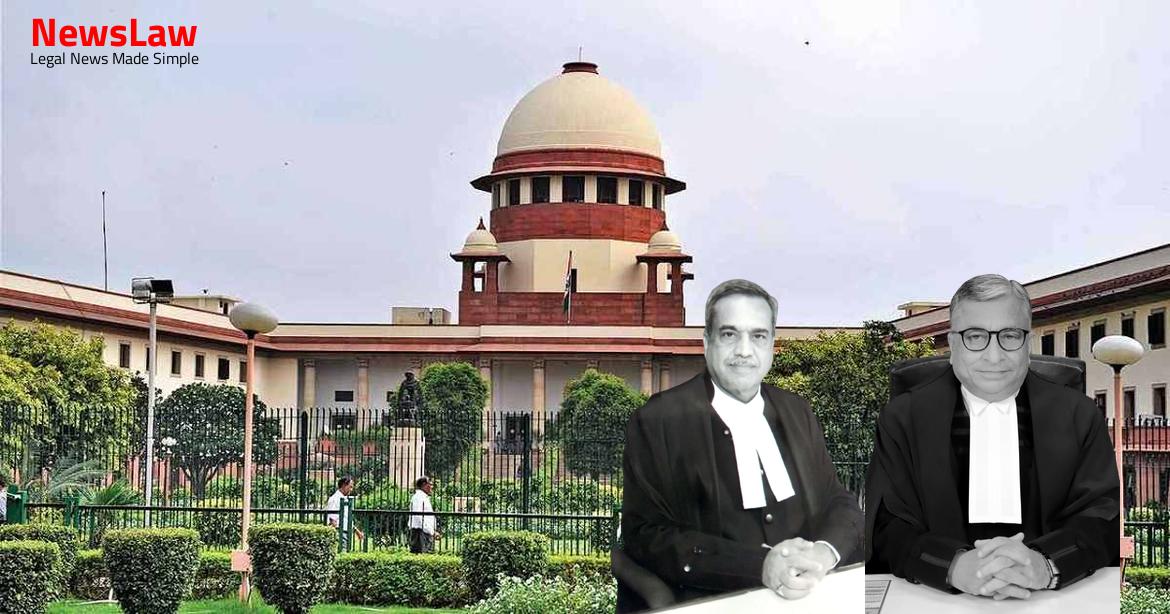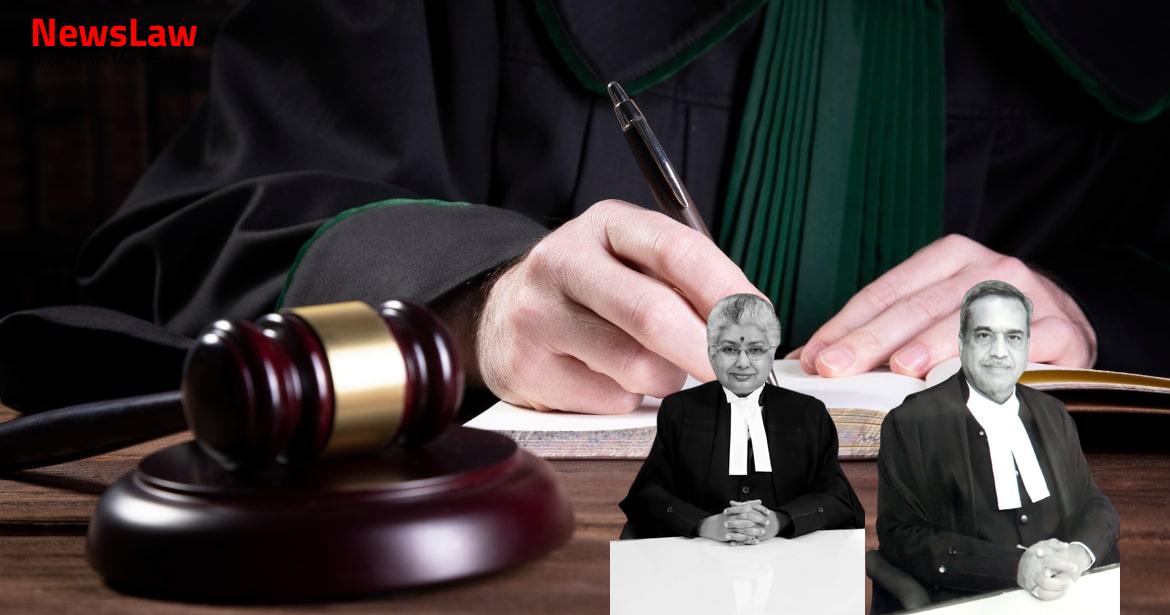The court also took note of the Constitution (Seventy-fourth) Amendment Act, 1992 which introduced Article 243-Q relating to the constitution and administration of municipal bodies and held that having regard to these developments, the issues which need adjudication in the present appeals have to be considered by a larger bench. The General Clauses Act, 1897 does not per se define a local area, however, it does define a “local authority”, by Section 2(31) in the following terms: “(31) “local authority” shall mean a municipal committee, district board, body of port Commissioners or other authority legally entitled to, or entrusted by the Government with, the control or management of a municipal or local fund.” The State of Orissa enacted the Orissa Entry Tax Act, 1999 (hereafter, “the Orissa Act”) which defined the local area so as to include industrial townships among other areas including areas within the industrial township constituted under Section 4 of the Orissa Municipal Act, 1950 (hereafter “the 1950 Act”), thereby subjecting goods entering into such areas, to entry tax.
Also Read: https://newslaw.in/supreme-court/legal-analysis-of-claim-for-loss-of-profit-in-delayed-contract/
3 3 The 1950 Act, by Section 4 provides that the State Government can constitute (a) a notified area council for every “transitional” area; (b) a municipal council for every smaller urban area; and (c) a municipal corporation for every larger urban area. The High Court by its impugned judgment dismissed SAIL’s writ petition holding that the Orissa entry tax did not violate any constitutional prohibition and was in conformity with Article 304(a) of the Constitution. OCL contended that having regard to the agreement (hereafter “Agreement”) which it had entered into with the Municipal Council, in regard to the provision of services and the nature of services provided, its industrial township could not be characterised as a local area. Both appeals are directed against the common judgment rendered by the Allahabad High Court dated 23.12.2011, which had negatived the contentions urged by it [along lines similar to those advanced by OCL and SAIL, before the Orissa High Court].
It was also submitted by the counsel that interpretation of Entry 52 in List II (of the Seventh Schedule to the Constitution) declared in Diamond Sugar Mills ( supra ) is applicable, even after introduction of Article 243-Q, under Part IX-A of the Constitution. Counsel submitted that such industrial establishment cannot be equated with an area administered by local authority i.e., local self-government such as a municipal or town area. Reliance was also placed on Diamond Sugar Mills Limited ( supra ) to argue that though the interpretation of the term ‘local area’ was given in respect of factory premises, the interpretation must not be limited only to a case of factory premises. Bagaria, relied on the dicta in Diamond Sugar Mills (supra) and also placed reliance on New Okhla Industrial Development Authority v Commissioner of Income Tax (hereafter, “NOIDA”) to contend that Article 243-Q of the Constitution of India does not contemplate constitution of an industrial establishment as a municipality and thus merely because OCL was providing municipal services in its area, it cannot be said that OCL is a municipality.
It was further argued that merely because SAIL provided municipal services within its industrial township area, does not make its area a ‘municipality’ or ‘local authority’. However, proviso to Article 243-Q exempts this requirement, in relation to declared industrial areas: “Provided that a Municipality under this clause may not be constituted in such urban area or part thereof as the Governor may, having regard to the size of the area and the municipal services being provided or proposed to be provided by an industrial establishment in that area and such other factors as he may deem fit, by public notification, specify to be an industrial township.”
It was submitted that in the present cases, notifications under the above provisions were issued, which meant that areas falling within industrial townships, were neither local areas, nor were they part of municipalities. It was urged that since the state law, by proviso to Section 4 (1) [i.e., Orissa Municipal Act, 1950] excluded from its operation, industrial establishments, the declaration of law in Diamond Sugar Mills (supra) bound the state, which could not then, include industrial establishments as local areas. Learned counsel additionally argued that the UP Entry Tax Act of 2007, to the extent it was retrospective, has to be struck down, as it is unfair and arbitrary.
Reliance was placed on the contents of the impugned notification to submit that the industrial township was open to public use and the concerned Rajanagar Municipality has right of using several amenities available including the drainage and sewage facilities to establish that the Industrial Township was open to public use just like any other Industrial Township in the country. It was further submitted that the judgment of this Court in Diamond Sugar Mills (supra) is not applicable, as the court, in that case, confined the meaning of the expression “local area” to areas where octroi was being levied and which were administered by a local body. Local areas cannot be treated as insulated pockets within a State and the facilities provided by the State are availed by local areas and they form essential part of intra-state trade. The counsel sought to distinguish the present case from NOIDA (supra) by arguing that while in latter, the court held that an industrial township 12 cannot be equated with a municipality defined under Article 243-(P)(e) as industrial township is specified on account of non-constitution of municipality, nevertheless the court did not decide an important question that whether an industrial township constituted under proviso to Article 243-Q read with provisions of the UPIAD Act is an administrative unit obligated to provide all municipal services envisaged by the municipal enactments in the area of the industrial township and therefore its area would be a local area.
Here, the industrial township is charged with rendering municipal services under a public notification and thus, the Industrial Township is administering the rendering of services like municipal services and the fact that industrial township is providing the services free of cost would not change the constitutional status.
Sugarcane (Regulations of State and Purchase) Act, 1953 in Section 20 and the U.P. Sugarcane Cess Act, 1956 in Section 3 to State to collect entry tax “into the premises of a factory”. Keeping these in mind, and also after considering the entry in Encyclopaedia Britannica relating “local area” for the purpose of collection of octroi as an indirect or consumption tax levied by political units, this Court concluded that under the Government of India Act, 1919 imposed a levy on import of goods into an area administered by local body i.e., a local government authority could be levied. Whether the entire area of the State, as an area administered by the State Government, was also intended to be included in the phrase “local area”, we need not consider in the present case.” The next decision of note is Shaktikumar M.
It was contended that the incidence of tax was on purchase value of motor vehicles and therefore the tax was really a purchase tax and further that a local area has a connotation of its own as being understood or administered by local authority and tax on entry of vehicle into a state as whole was invalid.
This Court repelled the argument stating that the Gujarat Industrial Development Act, 1962 operates in a different sphere from Parts IX and IX-A of the Constitution as well as the Gujarat Panchayats Act, 1961 under the Gujarat Municipalities Act, 1962. “Explaining the purpose behind Section 16 the High Court has rightly held that having regard to the power conferred upon the Gujarat Industrial Development Corporation in the matter of provision of amenities and common facilities in industrial estates and industrial areas, on levy of certain charges upon those who set up industries therein, an industrial area would ordinarily be a self-sufficient township in itself which provides its own amenities and recovers charges therefor. It is to avoid this virtual dual control and administration which might impede the growth and development of industries that provision has, 16 presumably, been made in Section 16 for constituting an industrial area into a notified area and thereby converting it into a separate administrative unit. No panchayat for industrial township —
Notwithstanding anything contained to the contrary in any Uttar Pradesh Act, where an industrial development area or any part thereof is specified to be an industrial township under the proviso to clause (1) of Article 243-Q of the Constitution, such industrial development area or part thereof, if included in a Panchayat area, shall, with effect from the date of notification made under the said proviso, stand excluded from such Panchayat area and no Panchayat shall be constituted for such industrial development area or part thereof under the United Provinces Panchayat Raj Act, 1947 or the Uttar Pradesh Kshettra Panchayats and Zila Panchayats Adhiniyam, 1961, as the case may be, and any Panchayat constituted for such industrial development area or part thereof before the date of such notification, shall cease to exist.” The court also noted that a joint reading of Section 12A with Article 243-Q clarified that unless a notification under proviso to Article 243-Q(1) was issued, industrial development areas were not per se excluded from the 17 ambit of panchayats. The constitutional provisions as contained in Part IXA delineate that the Constitution itself provided for constitution of Municipalities, duration of Municipalities, powers of Authorities and responsibilities of the Municipalities. It is true that various municipal functions are also being performed by the Authority as per Act, 1976 but the mere facts that certain municipal functions were also performed by the authority it cannot acquire the essential features of the Municipality which are contemplated by Part IXA of the Constitution.
Thus, proviso does not contemplate constitution of an industrial establishment as a Municipality rather clarifies an exception where Municipality under clause (1) of Article 243Q may not be constituted in an urban area. Likewise, in MGR Industries (supra), the court held that without a notification under proviso to Article 243-Q, mere declaration of an area as an industrial area or township, did not result in the exclusion of that area, from the coverage of a panchayat. The view expressed in Diamond Sugar Mills (supra), was that a local area, is an area, falling within a “local authority such as a municipality, a district Board, a local Board or a Union Board, a Panchayat or somebody constituted under the law for the governance of the local affairs of any part of the State.” That articulation was relevant because the levy of tax involved in that decision imposed a duty on the entry of goods into factory premises. Entry Tax law, “local area” has been defined expansively, to cover all areas, including industrial establishment areas. By the UP Municipalities Act, 1916, a municipality and a municipal area have been defined as follows: ‘(9) “Municipality” means an institution of self Government referred to in clause (e) of Article 243P of the Constitution.
These views were expressed by the then Minister of State for Urban Development while introducing the Constitution Amendment Bill before Parliament and thus the new provisions were added in the Constitution with a view to restore the rightful place in political governance for local bodies. However, that some municipal functions are performed by such bodies ipso facto does not result in their acquiring the features of municipalities which are contemplated by Part IX-A of the Constitution. As noticed earlier, all the judgments, dealing with provisions of Part IX-A of the Constitution were not rendered in the context of applicability or imposition of entry tax, or whether such areas excluded by virtue of notifications under proviso to Article 243-Q(1) ceased to be local areas.
The pattern of State enactments – which emerges from a reading of various decisions of this Court is that every State has a set of municipal or local self-governance laws, such as those dealing with municipalities, cantonments, panchayats, gram panchayats, etc., on the one hand, and those that deal with industrial areas – as for instance, the UPIAD Act, Gujarat Industrial Development Act, 1962 etc. As far as the nature of services provided in industrial areas are concerned, those are relevant factors taken into account by the State or Governor while issuing exemptions under municipal laws or proviso to Article 243Q (1). The application of state laws regarding industrial areas, therefore, squarely falls within the expression “description of a body constituted for the purposes of local affairs of the State” since no one denies that industrial areas are also part of the State. MGR Industries (supra) is an important judgment because the Court held that the mere exclusion of an industrial area under a local enactment was insufficient for it to be removed from the coverage of Panchayat’s jurisdiction in the absence of a notification under Article 243-Q (1). The object of the levy, i.e., entry tax, is the regulation of entry of goods in a regular area for consumption, i.e., manufacture, use or sale. The Court is of the opinion that the argument – made by counsel that the levy could not be retrospective, in the facts of this case, is insubstantial. [UDAY UMESH LALIT]
Case Title: M/S. OCL INDIA LTD. Vs. STATE OF ORISSA . (2022 INSC 1163)
Case Number: C.A. No.-002348-002348 / 2004



